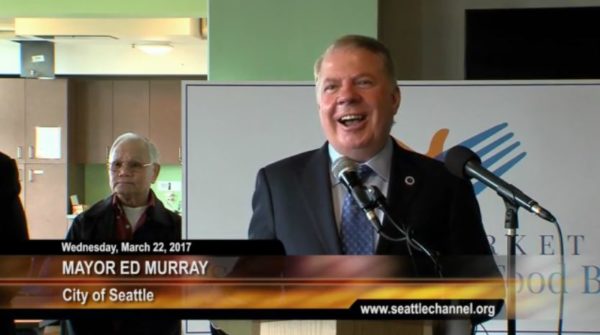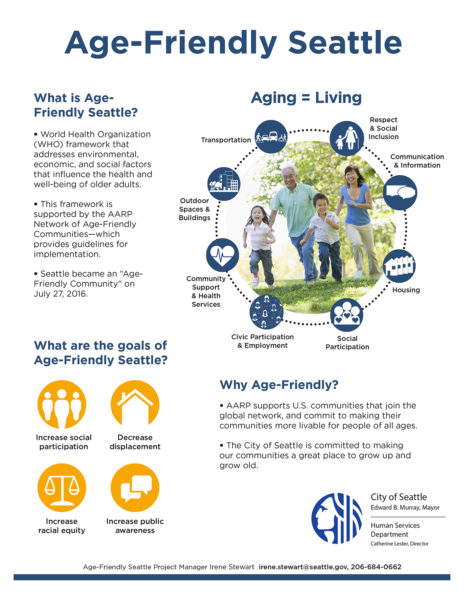Mayor Ed Murray Launches Age-Friendly Initiative in Seattle

On March 22, 2017, Mayor Ed Murray launched Age-Friendly Seattle—a new initiative for the City of Seattle to address environmental, economic, and social factors influencing the health and well-being for older adults.
Age-Friendly Seattle is another part of Mayor Murray’s ongoing work to increase equity in Seattle. Its goals are to increase social participation, decrease displacement, increase racial equity and social justice, and increase awareness of issues that older adults face daily. As the population of older adults in the City of Seattle increases, the City is developing goals and indicators around departmental initiatives that consider aging adults.

Click on the image above to watch video of the Age-Friendly Seattle press conference on March 22 at the Pike Market Senior Center.
Mayor Murray outlined several department-specific early action items for 2017 as follows:
- Seattle Department of Transportation: Improve the pedestrian environment by assessing sidewalks with the involvement of seniors, implement walkability audits, promote transportation options for older adults, and incorporate age-friendly criteria into the Pedestrian Master Plan Implementation Plan for 2018–2022.
- Human Services Department: Increase usage of the Regional Reduced Fare Permit with King County Metro, improve aging services provided or facilitated by the City by implementing a “no wrong door” program structure.
- Human Services Department, Department of Parks and Recreation, and Office of Sustainability and Environment: Involve seniors in the development and engagement process for new capital investments and increase participation in senior-focused recreation and healthy food programs.
- Human Services Department and Office of Housing: Collaborate on development of a regional housing action plan to assess senior housing needs, identify low-income seniors to participate in the Utility Discount Program and the senior property tax exemption program; increase access to weatherization services, home repair, and foreclosure prevention programs; and evaluate feasibility of senior home-sharing options.
“As Seattle and other cities experience a demographic shift, the need for an age-friendly design is becoming ever more critical,” said Mayor Murray. “From urban planning, growth and development to housing, transportation and services, these aspects of our community may be shaped for and by our older citizens.”
In addition to early actions listed above, Mayor Murray committed to two community equity forums—one focused on the needs of lesbian, gay, bisexual, and transgender elders; the other on the needs of older women. Also, the City is looking to provide older adults with better access to human services and City resources, based on best practices and innovative solutions from other cities and new technologies.

Click on the image above to read more about the City of Seattle’s commitment to becoming more age-friendly.
“It is important to me and to our City that we take care of our elders. This requires that we are creating opportunities for social participation, promoting health and wellness, and making sure our physical environment is accessible. These are the type of things that allow Seattle to continue to be a place where people of all ages and stages of life can thrive,” said Catherine L. Lester, Director of the City’s Human Services Department. “Our elders, as well as all people in our community, must feel valued to fully be a part of our community.”
The Seattle Human Services Department also will design an Innovation Fund to identify and award funds for unique and creative projects that meet community needs. The first year will focus on Age-Friendly Seattle, and will be funded within the department’s current budget allocation.
The City will consider suggestions for age-friendly improvements in the 2018 budget and will report on the progress of the initial three-year plan to the Human Services and Public Health Committee, or other appropriate City Council committee, in 2021.
Currently, 18 percent of King County’s residents are 60 years and older. By 2040, that number is expected to grow to one in four adults (25 percent). Currently, 63 percent of King County renters are 65 or older and, on average, they spend more than 30 percent of their annual income on housing. Racial disparities persist in these findings. Of the 63 percent of older adults who spend 30 percent or more on housing, 60 percent are Black/African American, 56 percent are Hispanic/Latino, and 47 percent are White.
In July 2016, Seattle joined the AARP Network of Age-Friendly Communities, an affiliate of the World Health Organization’s Global Network of Age-Friendly Cities and Communities. This initiative outlines “The 8 Domains of Livability,” which include:
- Outdoor Spaces and Buildings
- Transportation
- Housing
- Social Participation
- Respect and Social Inclusion
- Civic Participation and Employment
- Communication and Information
- Community and Health Services
The AARP/WHO framework looks for improvements in these specific areas that influence the health and quality of life our city’s older residents. This initiative aims to help the region support the positive contributions of older adults and enable people of all ages and abilities to achieve their potential.
Video from the March 22 announcement is available on The Seattle Channel (click here). For more information, e-mail Age-Friendly Seattle project manager Irene Stewart at Irene.stewart@seattle.gov. For general information about age-friendly communities, visit these previous AgeWise King County articles: Age-Friendly Communities—A Growing Movement (October 2016) and Age-Friendly Communities: Civic Participation (January 2016) as well as Age-Friendly Communities: The Value of Social Participation in this issue.
This article originally appeared in Agewise King County (April 2017).
![Aging & Disability Services for Seattle & King County [logo]](https://www.agingkingcounty.org/wp-content/themes/sads/images/seattle-ads-logo.png)